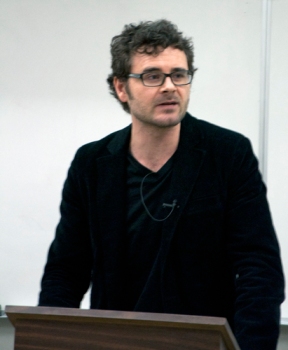Devan C. Tasa, News Editor Ω

Jeffery Webber from Queen Mary, University of London, talks about the political left in Latin America during International Days on Feb. 5. – Photo by Devan C. Tasa
Since 2008’s financial crisis, Latin American’s political left has been rising, but that comes with ideological contradictions, said International Days guest scholar Jeffrey Webber.
Webber, political science lecturer at Queen Mary, University of London , spoke to approximately 40 people on Feb. 5 in the International Building.
“In 1990, it would have been difficult to foresee Latin American on the forefront of challenging [right-wing] neo-liberalism,” Webber said.
That’s because most of Latin America had just gotten out of dictatorships that actively oppressed left-wing movements like political parties, unions and human rights activists.
Around the time of the 1998 Argentine financial crisis, the left became an active political force. As regular citizens became worse off and social safety nets eroded, more joined forces with workers’ and indigenous rights movements.
As the movements became more powerful, they started contesting elections and winning them. Examples are Venezula’s Hugo Chávez in 1999 and Bolivia’s Evo Morales in 2006.
These left-wing governments consolidated their power as a result of the 2008 financial crisis, helped by China’s demand for natural resources. Those revenues funded stimulus packages targeting the poor.
The left-wing governments have also moderated their ideological stance towards the centre to appeal to more voters. This has caused the more radical groups that had supported the government to form their own parties.
Webber is no stranger to TRU. He spent two years here as a student when it was known as the University College of the Cariboo.